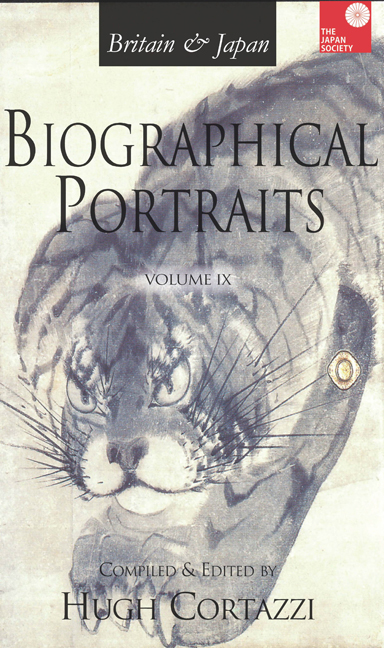Book contents
- Frontmatter
- Contents
- Introduction
- List of Contributors
- Index of Biographical Portraits in Japan Society Volumes
- PART I JAPAN IN BRITAIN: THINGS JAPANESE
- PART II BRITAIN IN JAPAN: TRADE
- BRITISH ACTIVITIES
- MISSIONARIES
- MUSIC, DRAMA AND FILM
- EPISODE
- PAINTERS
- JOURNALISTS
- JAPANESE WOMEN PIONEERS
- PART III SCHOLARS AND WRITERS: JAPANESE
- BRITISH
- PART IV POLITICIANS AND OFFICIALS: JAPANESE
- BRITISH OFFICERS
- BRITISH JUDGES AND A DIPLOMAT
- BRITISH POLITICAL FIGURES
- Index
40 - Wolf Mendl (1926-1999): Leading Scholar in the Field of International Relations
Published online by Cambridge University Press: 30 April 2022
- Frontmatter
- Contents
- Introduction
- List of Contributors
- Index of Biographical Portraits in Japan Society Volumes
- PART I JAPAN IN BRITAIN: THINGS JAPANESE
- PART II BRITAIN IN JAPAN: TRADE
- BRITISH ACTIVITIES
- MISSIONARIES
- MUSIC, DRAMA AND FILM
- EPISODE
- PAINTERS
- JOURNALISTS
- JAPANESE WOMEN PIONEERS
- PART III SCHOLARS AND WRITERS: JAPANESE
- BRITISH
- PART IV POLITICIANS AND OFFICIALS: JAPANESE
- BRITISH OFFICERS
- BRITISH JUDGES AND A DIPLOMAT
- BRITISH POLITICAL FIGURES
- Index
Summary
DR WOLF MENDL was a distinguished teacher in the field of international relations at Kings College, University of London for twenty-six years. He published several significant books on the subject of relations between Japan and China in the Cold War period and did much to encourage an interest in Japan in the contemporary period, being elected president of the British Association of Japanese Studies in 1989–1990.
Wolf was of Austro-German extraction, leaving Berlin for England in 1936. Educated at Watford Grammar School, he went on to study history at the University of Cambridge. Wolf followed his mother into membership of the Religious Society of Friends (Quakers) in 1946. He spent three years in Yorkshire teaching history at Wennington School, a progressive, co-educational independent school (1950–1953) and moved to a Quaker institution, Pendle Hill, outside Philadelphia, where he studied pacifism.
The American Friends Service Committee asked him to organize international student seminars in Japan. From 1955 to 1957 he served in Tokyo as director of the Quaker Student Seminar. It was a significant time for Japanese university students many of whom had lost faith in their country and were attracted by communism. It was thought important, therefore, that they should have international contacts. Mendl's administrative role was to provide the opportunity for them to have informal exchanges of views with foreigners. Wolf wrote of this period in his self-effacing way: ‘When I first set foot in the country my knowledge of it was sufficient to fill the back of the proverbial postage stamp. It had only just emerged from the isolation of the post-war occupation and was largely unknown in Europe.’ He quickly immersed himself in the country and was to marry a Japanese, Endō Keiko, in 1959. This was a formative period in the development of Wolf's thinking about Japan. In an article which comes close to being an autobiographical essay, he reveals:
When I went there in 1955, I was inclined to be very sympathetic because I had been terribly shocked by the atomic bombs….. But after a period of falling in love with Japan, I came to a more detached view with the realization that, in a hidden way, what happened at Hiroshima and Nagasaki was often used to obliterate the shame of atrocities committed by the Japanese armies in Asia.
- Type
- Chapter
- Information
- Britain & Japan Biographical Portraits Vol IX , pp. 465 - 468Publisher: Amsterdam University PressPrint publication year: 2015



